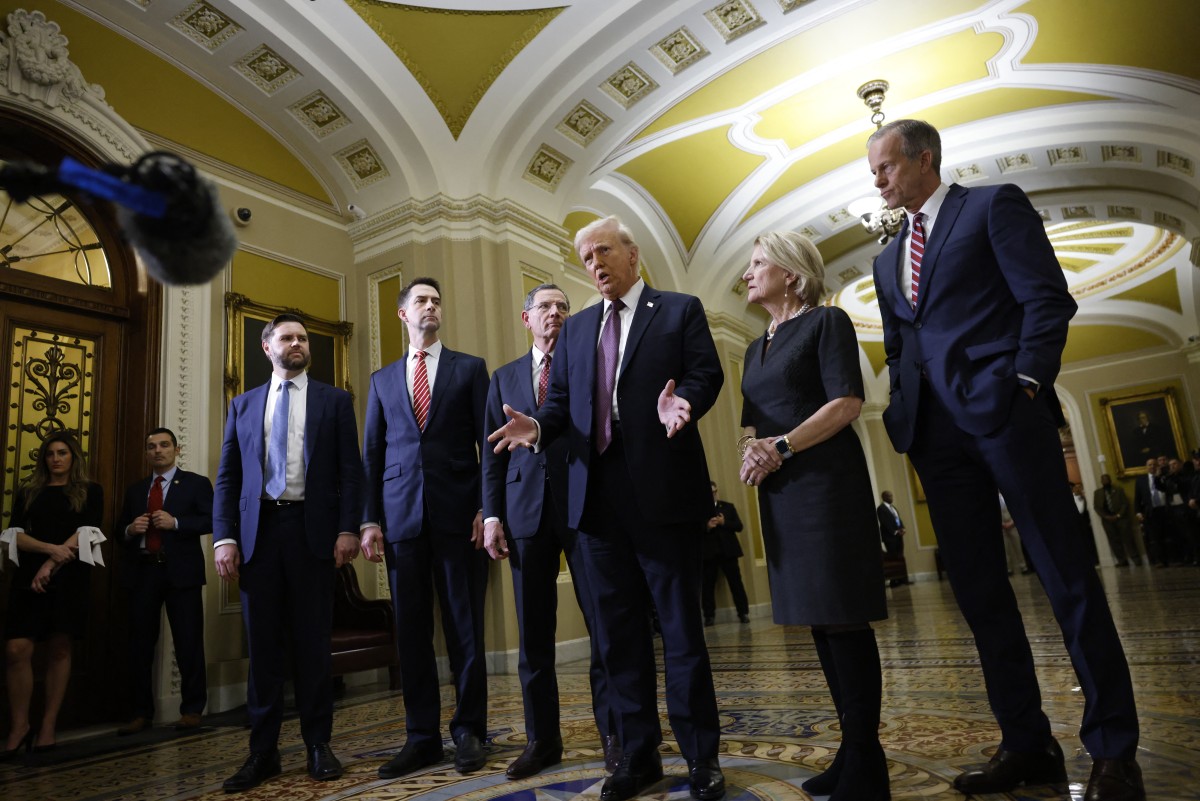
U.S. President-Elect Donald Trump gives a press conference in the Capitol, January 8th.
Ting Shen / AFP
Donald Trump’s recent refusal to rule out military intervention in his outspoken quest to acquire Greenland left the EU in panic and disarray.
While some leaders, such as France’s President Emmanuel Macron and Germany’s Chancellor Olaf Scholz jumped at the opportunity to act tough and stay relevant on the international stage, the European Commission adopted the opposite strategy and tried its best to bury its head in the sand.
Trump’s powerplay unmasked Europe as a headless chicken prone to panic whenever faced with unseen challenges, which leaves the U.S.—or rather, Trump—as the one calling the shots.
In 2019, when Donald Trump first expressed interest in acquiring Greenland, Denmark dismissed it as an April Fools’ joke. However, in December last year, while announcing his nominee for U.S. ambassador to Denmark, the president-elect reaffirmed that the U.S. considered “the ownership and control of Greenland an absolute necessity.” Then, on Tuesday, January 7th, during a press conference at Mar-a-Lago, Trump went further, challenging Denmark’s legal claim to the island and leaving open the possibility of using military or economic pressure to assert U.S. control over the Arctic territory.
Danish foreign minister Lars Løkke Rasmussen in response soberly stated that the U.S. and NATO have a “legitimate” interest in Greenland and that his country is “open to a dialogue” with the U.S. about closer cooperation.
At a press conference on Wednesday, January 8th, EU Commission spokesperson Anitta Hipper dodged every question related to Greenland, saying only that the EU executive “will not go into specifics” regarding Trump’s threats even after repeatedly being pressed by journalists.
”It is clear that the sovereignty of states has to be respected,” Hipper reluctantly said in the end, but quickly added that a U.S. invasion of Greenland was “very theoretical” and that Brussels was looking forward to cooperating with the incoming Trump administration toward “a stronger transatlantic agenda.”
While Greenland does hold immense strategic value for the U.S., Trump’s remark appears to be more like a rhetorical stunt to stir up the water and see how Europe reacts before making some kind of deal with Denmark about expanding the Arctic island’s already established U.S. military presence.
And while it’s not easy to come up with a good strategy when faced with an unusual situation, the non-reply Brussels gave is probably the worst course of action, a show of weakness and surrender to the new transatlantic situation.
The opposite strategy—taken by Macron and Scholz—is not much better. Scholz gave Trump a lecture on the “inviolability of borders” that even “a very powerful state … must respect.” Macron went one step further by speaking on behalf of the entire EU. “There is no question of the EU letting other nations in the world, whoever they may be, attack its sovereign borders,” the president warned.
Despite all the talk of “strategic autonomy,” Europe as a whole reverted to being completely reliant on U.S. arms and energy in the past three years and has only itself to blame for it. Now, not even France or Germany can afford to lose Washington’s support while being locked in the ongoing geopolitical struggle for Ukraine.
Also, it’s quite ironic to hear them talk about “EU sovereignty”—the EU is not sovereign; only its member states are, and Brussels is continuously trying to undermine their sovereignty to increase its own influence.
All Macron and Scholz achieved was to show there was no sense of strategic unity or unquestionable leadership in Europe. France and Germany are eager to one-up each other in the race to be recognized as the bigger power while also jumping ahead of the Commission—especially when von der Leyen is out sick—to regain influence they lost to Brussels.
Today, Greenland is classified as one of the Overseas Countries and Territories (OCTs)—not formally part of the European Union but enjoying certain EU benefits, including eligibility for EU funding and access to the EU’s single market in some areas. However, a 2024 poll indicated a shift in sentiment, with 60% of Greenlanders now supporting full EU membership.
Greenland’s Prime Minister Múte Bourup Egede said on Tuesday he does not intend to engage in the geopolitical squabble.
“Greenland belongs to the people of Greenland,” he said. “Our future and fight for independence is our business.”
